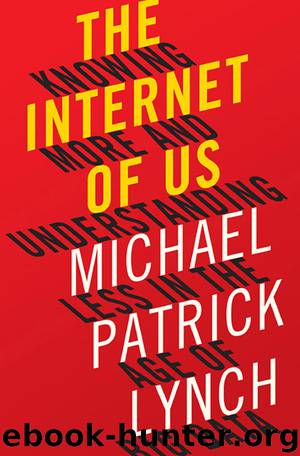The Internet of Us by Michael P. Lynch

Author:Michael P. Lynch
Language: eng
Format: epub
Publisher: Liveright
The “Netography” of Knowledge
So far, we’ve left out a subtler but possibly more important point: our networked lives might be altering the very structure of knowledge.
Weinberger puts the matter this way:
Our system of knowledge is a clever adaption to the fact that our environment is too big to be known by any one person. A species that gets answers and can then stop asking is able to free itself for new inquiries. . . . [T]his strategy is perfectly adapted to paper-based knowledge. Books are designed to contain all the information required to stop inquiries within the book’s topic. . . . [But with our new] connective medium . . . our strategy is changing. And it is changing the very shape of knowledge.12
Weinberger’s point is that we’ve traditionally seen building or expanding the body of knowledge as the expansion of a series of “stopping points.” Inquiry, scientific or otherwise, was aimed at getting to someplace safe, an answer we could trust. Once we got there, we could move on. But in Weinberger’s view, the new mediums for knowledge created by digital technology are changing this picture. That’s because, in his view, the Internet doesn’t really deal with stopping points.
The notion that knowledge can have a shape—a structure—goes back a long way in Western culture. Plato himself drew something of a graph of knowledge, his so-called “divided line,” which depicted a difference between true knowledge and mere opinion. True knowledge was founded, Plato thought, on a grasp of the eternal essences he called the Forms—another structural metaphor. Ultimate reality was comprised of the Forms, and hence the only true knowledge started with knowledge of them.
Since the seventeenth century, the dominant structural metaphor for knowledge has been architectural. Again, René Descartes deserves much of the credit (or the blame, depending).13 According to so-called Cartesian foundationalism, the structure of knowledge is like a building or pyramid, with the foundation supporting the upper floors. Similarly, our beliefs are supported by other beliefs and ultimately by foundational beliefs and principles. Descartes’ view was that if our house of belief was going to be stable and lasting, it had to end at certain propositions that were so obviously true that they were beyond any shadow of a doubt. These were the foundation stones—the ultimate stopping points.
The classic problem with Descartes’ own version of this network was that he was a picky mason. Foundation stones that met his high standards were hard to find. To his mind, a foundational belief had to be certain and self-evident. His most famous example of the perfect foundation stone was a belief about himself: I think, I exist, is necessarily true whenever any of us thinks it. And that seems right: if anything is self-evident, it is that I think, for the simple reason that I can’t doubt that I think without thinking. It is, as it were, a thought I can’t escape. The problem is that this doesn’t get us very far.
Later philosophers have tended to be less picky, but many stuck with the metaphor.
Download
This site does not store any files on its server. We only index and link to content provided by other sites. Please contact the content providers to delete copyright contents if any and email us, we'll remove relevant links or contents immediately.
| Anthropology | Archaeology |
| Philosophy | Politics & Government |
| Social Sciences | Sociology |
| Women's Studies |
The remains of the day by Kazuo Ishiguro(9000)
Tools of Titans by Timothy Ferriss(8398)
Giovanni's Room by James Baldwin(7347)
The Black Swan by Nassim Nicholas Taleb(7131)
Inner Engineering: A Yogi's Guide to Joy by Sadhguru(6797)
The Way of Zen by Alan W. Watts(6615)
The Power of Now: A Guide to Spiritual Enlightenment by Eckhart Tolle(5784)
Asking the Right Questions: A Guide to Critical Thinking by M. Neil Browne & Stuart M. Keeley(5775)
The Six Wives Of Henry VIII (WOMEN IN HISTORY) by Fraser Antonia(5516)
Astrophysics for People in a Hurry by Neil DeGrasse Tyson(5191)
Housekeeping by Marilynne Robinson(4449)
12 Rules for Life by Jordan B. Peterson(4306)
Ikigai by Héctor García & Francesc Miralles(4275)
Double Down (Diary of a Wimpy Kid Book 11) by Jeff Kinney(4273)
The Ethical Slut by Janet W. Hardy(4258)
Skin in the Game by Nassim Nicholas Taleb(4250)
The Art of Happiness by The Dalai Lama(4130)
Skin in the Game: Hidden Asymmetries in Daily Life by Nassim Nicholas Taleb(4007)
Walking by Henry David Thoreau(3963)
